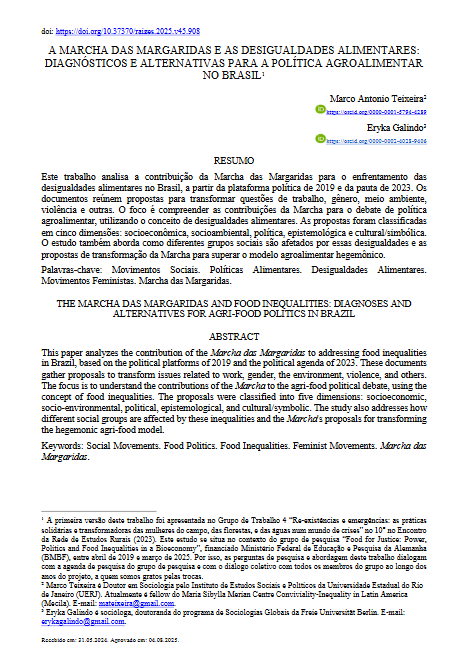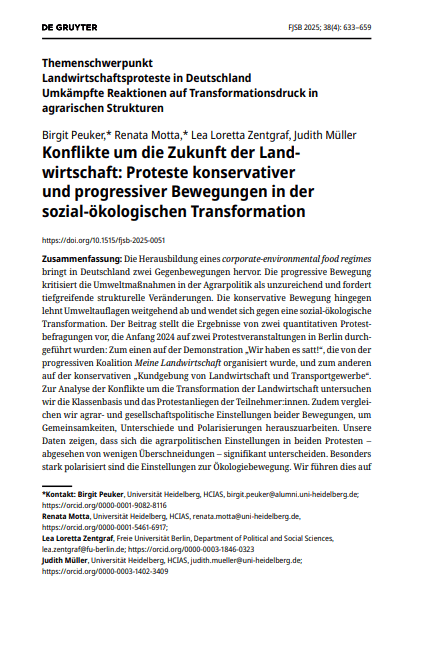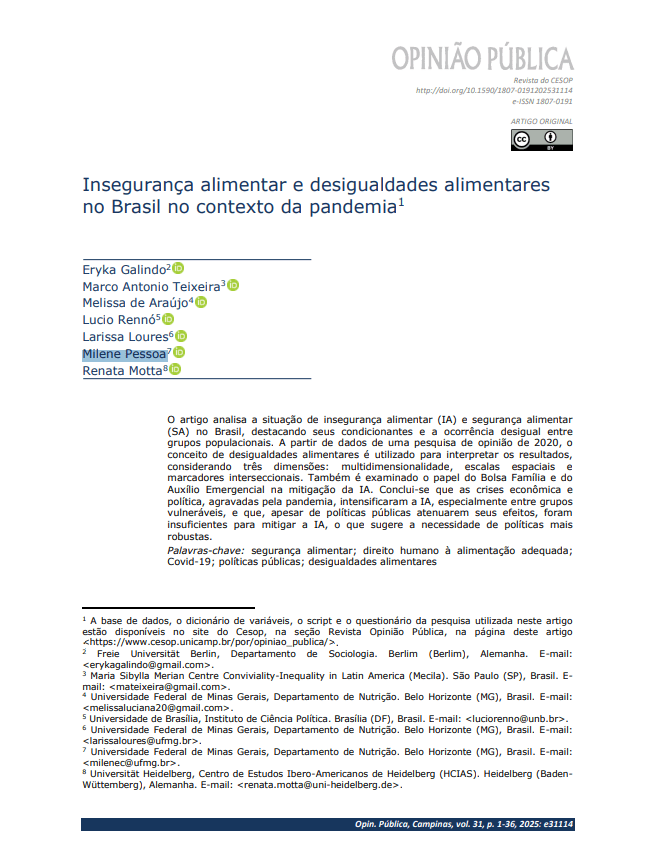Our Publications
Revista Raízes • 2025
THE MARCHA DAS MARGARIDASAND FOOD INEQUALITIES: DIAGNOSES AND ALTERNATIVES FOR AGRI-FOOD POLITICSIN BRAZIL
Abstract
This paper analyzes the contribution of the Marcha das Margaridas to addressing food inequalities in Brazil, based on the political platforms of 2019 and the political agenda of 2023. These documents gather proposals to transform issues related to work, gender, the environment, violence, and others. The focus is to understand the contributions of the Marchato the agri-food political debate, using the concept of food inequalities. The proposals were classified into five dimensions: socioeconomic, socio-environmental, political, epistemological, and cultural/symbolic. The study also addresses how different social groups are affected by these inequalities and the Marcha’s proposals for transforming the hegemonic agri-food model
[Transcript] • 2025
Politik der Lebensstile und Protest auf der »Wirhaben es satt!« Demonstration Reflexives Wissen in Agrar- und Ernährungsbewegungen
Abstract
The article “Politics of lifestyles and protest at the ‘Wir haben es satt! ‘ – reflexive knowledge in agricultural and food movements’ by Birgit Peuker, Renata Motta, Judith Müller and Lea Loretta Zentgraf explores the question of how protest against government policy and a lifestyle policy aimed at changing everyday practices are linked in the “We’ve had enough!” protest movement. Based on the discussion about the relationship between ‘combative politics’ and a ‘politics of lifestyles’ in social movement research and a focus on food practices, agricultural and food movements in Germany are empirically examined, using document analyses, participant observations and qualitative interviews, and in particular a quantitative protest survey of the ‘We’ve had enough!’ demonstration. A key finding of the study is that the connection between the “politics of lifestyles‘ and the political protest ’Wir haben es satt!” is convincing when protesters implement their political demands for a different agricultural and food system in their own everyday practices and develop knowledge and skills for this purpose. At the same time, social movements such as ‘Meine Landwirtschaft’ (My Agriculture) can be understood as ‘places of learning’, because the movement conveys values of social and ecological justice, which it uses to evaluate its own actions, but also those of politicians and entrepreneurs.”
Forschungsjournal Soziale Bewegungen • 2025
Conflicts over the future of agriculture: protests by conservative and progressive movements in the socio-ecological transformation
Abstract
The emergence of a corporate-environmental food regime in Germany has given rise to opposing movements. The progressive movement criticizes current environmental policies in agriculture as insufficient and calls for far-reaching structural changes. In contrast, the conservative movement largely rejects environmental regulations and opposes a socio-ecological transformation. This article presents findings from two quantitative protest surveys conducted in early 2024 at demonstrations in Berlin: the progressive “Wir haben es satt!” (“We’re fed up!”) protest and the conservative “Kundgebung von Landwirtschaft und Transportgewerbe” (“Rally of Agriculture and the Transport Sector”). To explore transformation conflicts in agriculture, we analyze the class composition and the motivations of protest participants. We also compare agrarian and socio-political attitudes across the two movements to identify areas of convergence, divergence, and polarization. Our findings show that, aside from a few overlapping views, the two protests differ significantly in their agrarian policy positions. The most pronounced polarization concerns attitudes toward the environmental movement. We attribute these differences to the distinct political orientations of the protests. Our conclusion is that the politicization of agrarian issues complicates efforts to build a consensus on the future of agriculture. While both movements critique the corporate-environmental food regime, only the progressive movement articulates a positive vision of an agroecological and socially embedded agriculture of the future.
Revista do CESOP • 2025
Food insecurity and inequalities in Brazil in the Context of the Pandemic
Abstract
This article analyses the situation of food insecurity (FI) and food security (FS) in Brazil, highlighting their determinants and unequal occurrence among population groups. Based on data from a 2020 opinion survey, the concept of food inequalities is used to interpret the results, considering three dimensions: multidimensionality, spatial scales, and intersectional markers. It also examines the role of the Bolsa Família grant and Emergency Aid in mitigating FI. The article concludes that the economic and political crises aggravated by the pandemic intensified FI, particularly among vulnerable groups, and that although public policies alleviated its effects, they were insufficient to mitigate FI, suggesting the need for more robust policies.
ELSEVIER • 2025
Food politics and activist networks in the city: Reaching places food and policies don’t
Abstract
According to scholarship on the state-society relations that inform food and urban politics, social movements and civil society are key agents of change thanks to their ability to develop alternative food initiatives, organize networks, and influence public policies. Celebrated as a world pioneer in food governance and nutrition security, Belo Horizonte offers insight into the role played by activist networks, including institutional activism in food policies. Yet how can food politics connect alternative urban ecology aspirations with food justice in the city? In order to answer this question, we draw on focus groups with state actors and civil society organizations (CSOs) engaged in urban food systems since the 1990s to reveal the hybrid character of these initiatives, activist networks that transcend institutional boundaries, and broader socioecological transformation in the urban food system through agroecology. As the hunger crisis deepened during COVID-19, social movements and state actors devised initiatives to get fresh, ecological, nutritious, quality food to places it was not reaching in the city. Our investigation reveals, first, that over three decades, networks comprised of state actors and CSOs have played a key role in Belo Horizonte food policies and politics, connecting the peripheries with the core where public policies are made. However, food inequalities stemming from spatial segregation remain a challenge for more inclusive food policies. Second, by sampling participants who have been active in the city’s food politics since the 1990s, our data shows the importance of tracing state-society networks over time, instead of focusing on critical moments of institutional building. Finally, the case of Belo Horizonte shows how local networks can influence public policies and actors at broader scales, even nationwide.
Multidisciplinary Journal for Circular Economy and Sustainable Management of Residues • 2024
SUSTAINABLE INTERVENTIONS TO MANAGE RETAIL FOOD WASTE: A SCOPING REVIEW
Abstract
The article addresses food waste (FW) in the retail sector and its impact on the economy, sustainability, food security, and climate. It presents a scoping review that identifies and categorizes 43 studies on interventions to reduce retail FW, sourced from four electronic databases.
The review found 132 interventions across 41 countries, primarily in Europe (73.2%), with supermarkets implementing 86.4% of these initiatives, targeting both consumers (50.8%) and their operations (46.2%). Interventions were classified into seven categories using a food waste hierarchy framework, focusing on preventive measures such as awareness campaigns, price reductions, operational optimizations, legal regulations, and food repurposing through donations. These strategies are promising and warrant further exploration, with about half quantifying their environmental, social, and economic impacts.
The findings emphasize the need for increased research investment in the global South.










